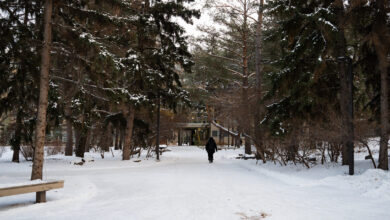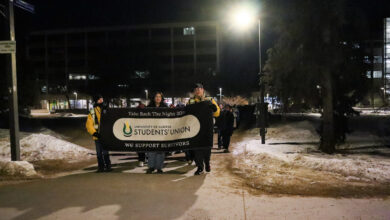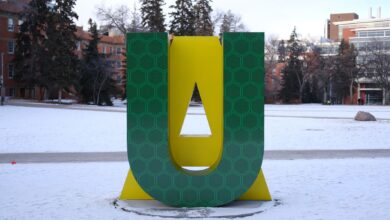Ahmadiyya Muslim Youth Association hosts Stop the CRISIS symposium at U of A
 Christina Varvis
Christina VarvisThe University of Alberta’s branch of the Ahmadiyya Muslim Youth Association hosted Stop the CRISIS on Nov. 27, an event which aimed to educate the public about the causes of youth radicalization and the often-misunderstood goals of Islam.
Edmonton Ward 12 City Councillor Amarjeet Sohi kicked off the event by reflecting on the 1985 bombing of a London–bound Air India flight from Toronto, which killed 329 people.
“This was how Islam was introduced to Canadians,” he said.
Sohi said he hopes that Canadians respond to the topic of radicalization similar to how he remembers Canadians responding to the 1985 bombing. He recalled Canadians coming together to speak against radicalization and intolerance and to “speak against pointed fingers at groups of people just because they happen to belong to a particular faith,” he said.
Though the world ”Islam” can be associated with both the Muslim community and the extremist Islamic State of Iraq and Syria (ISIS), keynote speaker and missionary of the Ahmadiyya Muslim Community Taha Syed said that the two groups should not be thought of as similar.
“The perspective of Islam amongst the general public in Canada can be based entirely on what is commonly seen on television, which often only shows the extremists,” Syed said. “In reality, radicalization is not a problem that can be traced to religion at all … it is a problem that you find in the twisted people of every society, from every background.”
Syed identified three commonalities between shooters and radicals in Canada. Age, impressionability and discontempt are a “recipe for radicalization, not religion,” Syed said. Radicalization occurs on an individual basis as the targeted individual is vulnerable due to personal conflict, such as feelings of isolation, he added.
“Unstable youth, dissatisfied with society and looking for a greater purpose, who wan to change their world and give vent to their frustrations … these are the people who are most susceptible to becoming radicalized,” Syed said.
According to Syed, what makes ISIS dangerous is the spread of the ideology, not its weapons or militant tactics. Because of this, the extremist group “cannot be stopped with guns and bullets alone.” Syed said that despite the international efforts from various armed forces across the world, the only way to combat the centre of the problem is through knowledge and education.
Additional speakers at Stop the CRISIS included Edmonton Police Service’s (EPS) Superintendent Operational Support Division Kevin Galvin and EPS community volunteers, Irfan Chaudhry and Iman Saidi, who have all worked to bridge the Muslim community and the police force.
Chaudhry said there’s a sense of misunderstanding between the rhetoric and ISIS’s ideals which suggest they’re promoting and representing the entire Muslim Faith. Those who don’t understand the Muslim faith might buy into that narrative, he added.
EPS and volunteers are currently working together to address certain conflicts within the Muslim community and improve risk management.
“When you have a community such as ours that’s working directly with the police, we have the opportunity to provide that guidance and really coordinate in different ways with the police to address certain issues in the community in a mutually-respectful way,” Chaudhry said.
Saidi said awareness of the situation is key.
“That’s what’s going to get the misconception of Islam out there to decrease,” she said. “Just basically make people aware of who we are as Muslims.”
For non-Muslims, the easiest way to help is to be aware about the peaceful goals of Islam and the causes of radicalization, so that the spreading of inaccurate information can be stopped, Syed said.
“This battle against extremism and radicalization is ultimately a battle for the mind.”




